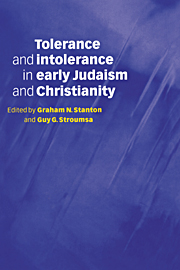Book contents
- Frontmatter
- Contents
- List of contributors
- List of abbreviations
- Introduction
- 1 Intolerance and martyrdom: from Socrates to Rabbi ‘Aqiva
- 2 The other in 1 and 2 Maccabees
- 3 The pursuit of the millennium in early Judaism
- 4 Conservative revolution? The intolerant innovations of Qumran
- 5 Who was considered an apostate in the Jewish Diaspora?
- 6 Why did Paul persecute the church?
- 7 Paul and the limits of tolerance
- 8 Philo's views on paganism
- 9 Coexisting with the enemy: Jews and pagans in the Mishnah
- 10 Tertullian on idolatry and the limits of tolerance
- 11 The threefold Christian anti-Judaism
- 12 The intertextual polemic of the Markan vineyard parable
- 13 Jews and Jewish Christians in the land of Israel at the time of the Bar Kochba war, with special reference to the Apocalypse of Peter
- 14 The Nazoreans: living at the boundary of Judaism and Christianity
- 15 Justin Martyr's Dialogue with Trypho: group boundaries, ‘proselytes’ and ‘God-fearers’
- 16 Accusations of Jewish persecution in early Christian sources, with particular reference to Justin Martyr and the Martyrdom of Polycarp
- 17 Early Christians on synagogue prayer and imprecation
- 18 Messianism, Torah and early Christian tradition
- 19 Jewish and Christian public ethics in the early Roman Empire
- Postscript: the future of intolerance
- General bibliography
- Index
12 - The intertextual polemic of the Markan vineyard parable
Published online by Cambridge University Press: 08 March 2010
- Frontmatter
- Contents
- List of contributors
- List of abbreviations
- Introduction
- 1 Intolerance and martyrdom: from Socrates to Rabbi ‘Aqiva
- 2 The other in 1 and 2 Maccabees
- 3 The pursuit of the millennium in early Judaism
- 4 Conservative revolution? The intolerant innovations of Qumran
- 5 Who was considered an apostate in the Jewish Diaspora?
- 6 Why did Paul persecute the church?
- 7 Paul and the limits of tolerance
- 8 Philo's views on paganism
- 9 Coexisting with the enemy: Jews and pagans in the Mishnah
- 10 Tertullian on idolatry and the limits of tolerance
- 11 The threefold Christian anti-Judaism
- 12 The intertextual polemic of the Markan vineyard parable
- 13 Jews and Jewish Christians in the land of Israel at the time of the Bar Kochba war, with special reference to the Apocalypse of Peter
- 14 The Nazoreans: living at the boundary of Judaism and Christianity
- 15 Justin Martyr's Dialogue with Trypho: group boundaries, ‘proselytes’ and ‘God-fearers’
- 16 Accusations of Jewish persecution in early Christian sources, with particular reference to Justin Martyr and the Martyrdom of Polycarp
- 17 Early Christians on synagogue prayer and imprecation
- 18 Messianism, Torah and early Christian tradition
- 19 Jewish and Christian public ethics in the early Roman Empire
- Postscript: the future of intolerance
- General bibliography
- Index
Summary
A discussion of the anti-Jewish polemic of the Gospel of Mark might profitably begin with Mark 12:9: ‘What will the lord of the vineyard do? He will come and destroy the tenants, and give the vineyard to others.’ This verse is an important key to Mark's intention, since it may very well be his own addition to the Parable of the Vineyard. There is no parallel to it in the Gospel of Thomas logion 65. It coheres with the Markan emphasis on Jesus’ concern for Gentiles or their positive reaction to him, and with the theme of destruction which pervades this section of Mark (11:18; 12:12; 13:1–2). The combination of the verbs δίδωμι and ἀπόλλυμι, moreover, recalls the redactional verse 3:6.
The redactional verse 12:9, and the parable of which it is now a part (12:1–9), use Old Testament imagery drawn from Isaiah 5:1–7, where Israel is spoken of as the Lord's vineyard and threatened with devastation by a foreign power as a punishment for its injustice and violence. Besides the similarity in overall theme between the two passages, the language of Mark 12:1–2 closely echoes that of Isaiah 5:1–2 LXX, where eight of the same Greek words are used to describe the planting and protection of the vineyard.7 The rhetorical question in Mark 12:9, moreover (‘What will the lord of the vineyard do?’), is similar in form to the rhetorical questions in Isaiah 5:4 and in vocabulary and force to the statement in Isaiah 5:5: ‘Now I will tell you what I will do to my vineyard.’
- Type
- Chapter
- Information
- Tolerance and Intolerance in Early Judaism and Christianity , pp. 211 - 227Publisher: Cambridge University PressPrint publication year: 1998
- 2
- Cited by



